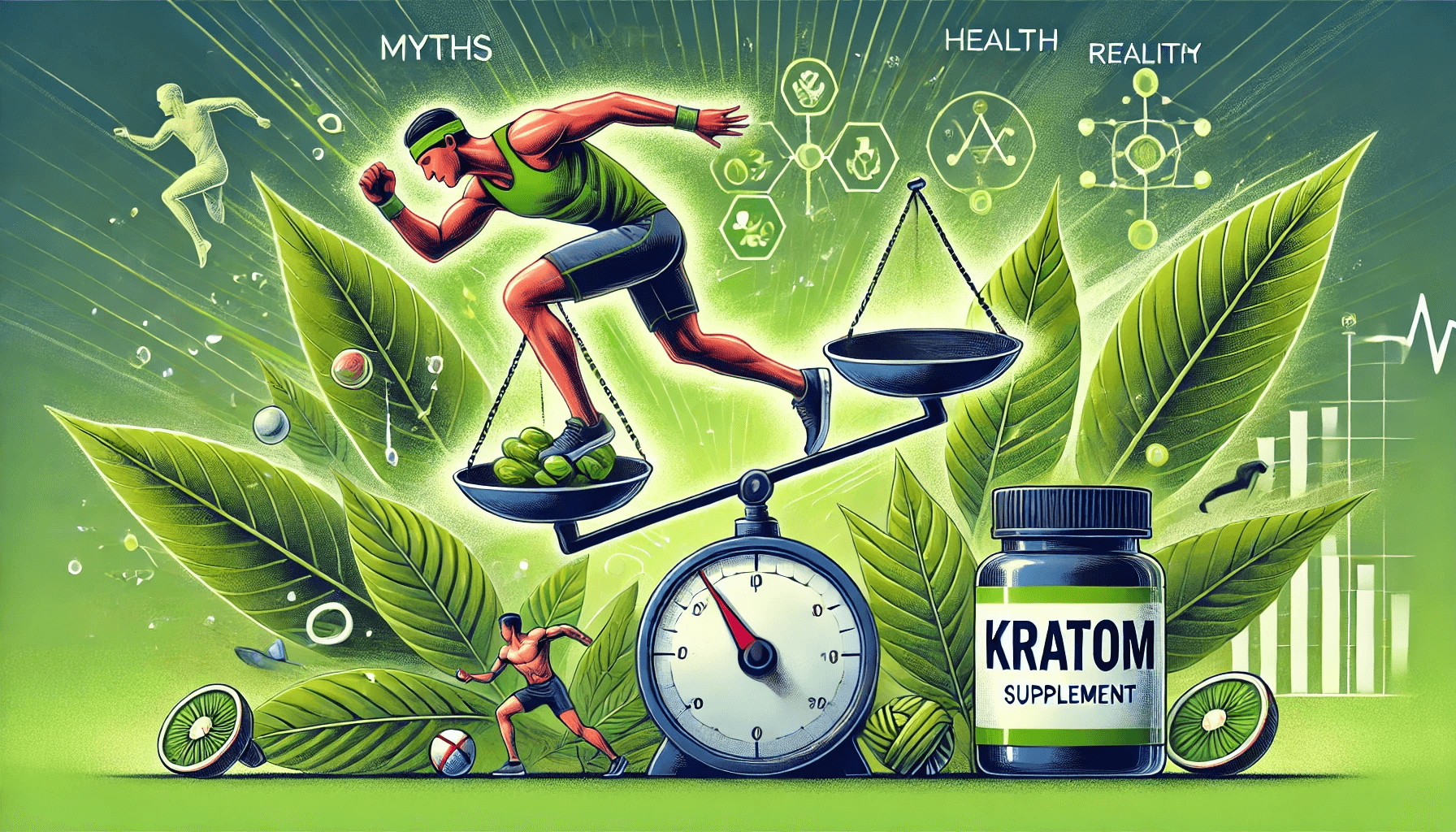1. Introduction
Kratom, or Mitragyna speciosa, is a tropical tree native to Southeast Asia, whose leaves have been used in traditional medicine for centuries. In recent years, this plant has attracted the attention of the sports community due to its potential properties that can enhance physical fitness and endurance.
The popularity of kratom among athletes is growing every year. More and more athletes, from amateurs to professionals, turn to this plant in search of a natural means to improve their performance. However, there are heated debates surrounding the use of kratom in sports, and expert opinions often diverge.
2. Claimed Benefits of Kratom for Athletes
Proponents of using kratom in sports nutrition attribute a number of beneficial properties to it:
– Increased Endurance: Many athletes claim that kratom helps them train longer and harder. This may be related to the stimulating effect of the alkaloids contained in the plant, which are said to increase energy and reduce the feeling of fatigue.
– Pain Relief and Post-Workout Recovery: One of the traditional uses of kratom is pain relief. Athletes report that using kratom helps them manage muscle pain after intense workouts and speeds up the recovery process.
– Improved Focus and Motivation: Some athletes note that kratom helps them better concentrate on their training and increases motivation. This can be especially useful in sports that require high levels of concentration.
It is important to note that these benefits are primarily based on anecdotal evidence and personal experiences of athletes. Scientific research in this area is still limited, and further study of kratom’s impact on physical activity and sports performance is required.
3. Scientific Research
Despite the growing popularity of kratom among athletes, scientific research on its effects on physical activity is still insufficient. Most existing studies focus on the general effects of kratom and its potential medical applications.
Review of Existing Research:
– A 2018 study published in “Frontiers in Psychiatry” showed that kratom may have analgesic and anti-inflammatory properties, which could be potentially beneficial for post-workout recovery.
– Another study published in the “Journal of Medicinal Chemistry” in 2016 found that mitragynine, the main alkaloid in kratom, may act as a stimulant, which explains the reports of increased energy and endurance.
Limitations of Current Research:
– Most studies have been conducted on animals or in vitro, not on human athletes.
– There are no long-term studies on the impact of regular kratom use on physical fitness.
– There are no standardized studies comparing the effectiveness of kratom with other sports supplements.
4. Myths About Kratom in Sports Nutrition
There are many myths surrounding the use of kratom in sports. Let’s examine the most common ones:
Myth 1: Kratom is a Legal Performance-Enhancing Drug
Reality: While kratom can indeed enhance performance, it cannot be considered a performance-enhancing drug in the traditional sense. Many sports organizations have not included kratom in the list of banned substances, but this situation may change as new research emerges.
Myth 2: Kratom is Safe in Any Dosage
Reality: Like any active substance, kratom can cause side effects, especially when used excessively. Overdose can lead to nausea, constipation, sleep problems, and even addiction.
Myth 3: Kratom is Suitable for All Athletes
Reality: The reaction to kratom is highly individual. What helps one athlete may not work or even harm another. Moreover, kratom can interact with certain medications and supplements, which is particularly important for professional athletes to consider.
It is important to remember that information about kratom is often based on personal experiences and anecdotal evidence. Athletes should critically evaluate claims about the “miraculous” properties of kratom and consult with sports doctors before using it.
5. Reality of Kratom Use in Sports
Potential Risks and Side Effects:
– Addiction: Regular use of kratom can lead to physical and psychological dependence.
– Digestive Problems: Some athletes report nausea, constipation, and loss of appetite.
– Sleep Disorders: The stimulating effect of kratom can cause insomnia, especially when taken in the evening.
– Interactions with Other Substances: Kratom can interact with certain medications and supplements, enhancing or weakening their effects.
Legal Status of Kratom in Sports Competitions:
Currently, kratom is not included in the list of banned substances by the World Anti-Doping Agency (WADA). However, its status may change in the future. Athletes should regularly check the updated lists of banned substances of their sports federations.
Individual Body Response:
The effect of kratom can vary significantly from person to person. Factors affecting the body’s response include:
– Individual Metabolism
– Overall Health Condition
– Type and Intensity of Physical Activity
– Dosage and Method of Kratom Use
6. Alternatives to Kratom in Sports Nutrition
Natural Supplements to Enhance Endurance:
- Caffeine: A widely studied stimulant that improves endurance and concentration.
- Beta-Alanine: An amino acid that helps increase muscle endurance.
- Creatine: Helps increase strength and muscle mass.
- Rhodiola Rosea: An adaptogen that can improve physical and mental performance.
Safe Recovery Methods Post-Workout:
- Proper Nutrition: A balanced diet with sufficient protein, carbohydrates, and healthy fats.
- Hydration: Adequate water intake before, during, and after workouts.
- Sleep: Ensuring enough quality sleep for recovery.
- Massage and Stretching: Help reduce muscle soreness and improve flexibility.
- Contrast Water Therapy: Alternating hot and cold water to improve circulation and reduce inflammation.
It’s important to note that these alternatives have a more extensive scientific basis and are considered safe when used correctly. Athletes are advised to consult a doctor or sports nutritionist before incorporating any supplements into their diet.
7. Expert Opinions
Comments from Sports Doctors:
Dr. Anna Smirnova, Sports Doctor: “While kratom may have some potential benefits for athletes, its use comes with risks. The lack of long-term studies and product standardization is concerning. I recommend athletes seek more studied and safer alternatives.”
Prof. Igor Volkov, Sports Physiologist: “The interest in kratom within the sports community is understandable, but we need more scientific data. We cannot yet confidently speak about its effectiveness and safety for enhancing athletic performance.”
Feedback from Professional Athletes:
Maria K., Professional Runner: “I experimented with kratom for a few months. I noticed improved endurance but also experienced sleep problems. I decided to stop using it due to its uncertain legal status.”
Alexey P., Powerlifter: “Kratom helped me deal with pain after intense workouts. However, I am concerned about the potential for addiction and prefer to use it rarely and in small doses.”
8. Conclusion
Summarizing the Role of Kratom in Sports Nutrition:
- Potential Benefits: Kratom may enhance endurance, reduce pain, and improve focus for athletes. However, these effects are mainly based on anecdotal evidence.
- Scientific Research: There is insufficient scientific research on kratom’s impact on athletic performance. Most existing studies focus on the general effects of kratom rather than its application in sports.
- Risks: Using kratom carries risks, including the potential for addiction, digestive problems, and sleep disturbances.
- Legal Status: The legal status of kratom in sports remains uncertain, posing additional risks for professional athletes.
- Safer Alternatives: There are more studied and potentially safer alternatives to kratom for enhancing athletic performance and post-workout recovery.
Recommendations for Safe Use (If Applicable):
- Consult a Doctor: Before using kratom, consult a doctor, especially if you have chronic conditions or take any medications.
- Start with Minimal Doses: Begin with minimal doses and monitor your body’s response carefully.
- Avoid Combining with Other Stimulants or Painkillers: Do not combine kratom with other stimulants or painkillers.
- Check Banned Substance Lists: Regularly check the banned substance lists of your sports federation.
- Maintain a Balanced Approach: Remember that kratom is not a substitute for proper nutrition, training regimen, and rest.
In conclusion, while kratom attracts attention in the sports community, its use requires caution and further study. Athletes are recommended to critically assess the potential risks and benefits based on scientific data and specialist consultations.






